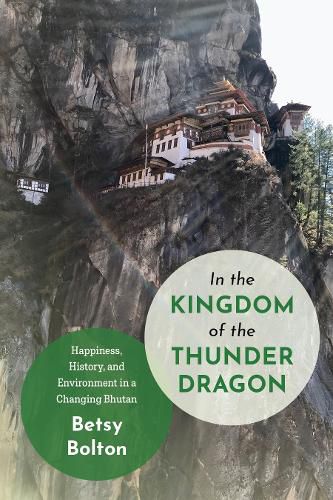Readings Newsletter
Become a Readings Member to make your shopping experience even easier.
Sign in or sign up for free!
You’re not far away from qualifying for FREE standard shipping within Australia
You’ve qualified for FREE standard shipping within Australia
The cart is loading…






Landlocked, mountainous, and surrounded by global giants India and China, Bhutan has provided remarkable leadership on both climate action and human happiness, despite its pre-2023 status as a least-developed nation. Bhutan was the first country to be internationally recognized as carbon neutral; it is also the birthplace of "Gross National Happiness" (GNH), a pointed alternative to Gross Domestic Product (GDP) as a means of measuring the success of national policies in promoting citizens' wellbeing. Yet Bhutan has also been a site of ethnic conflict, with roughly 100,000 people displaced into refugee camps in the 1990s and eventually resettled abroad.
International views on Bhutan tend to be sharply split between admiration for its democratizing development strategies and opposition to its human rights abuses-a division partly maintained by Bhutan's tight limits on immigration and foreign travel within the country. In the first book-length study of its kind, In the Kingdom of the Thunder Dragon explores the tensions and contradictions of Bhutan's rapid political and economic transformation from the perspective of a Fulbright scholar helping start a new master's program in the remote east of the country.
Mingling personal narrative with historical context to engage undergraduate students and general readers, In the Kingdom of the Thunder Dragon explores Bhutan's Vajrayana Buddhist heritage and ongoing embrace of tradition alongside development, the country's newly minted democracy amidst a complicated history of citizenship and belonging, and the challenges the nation faces in a period of increasing globalization. Betsy Bolton further explores Bhutan's recent events surrounding the 1990s expulsion of the Lhotshampa people and the development of GNH in the early 2000s. From here, Bolton illuminates how these historical narratives and issues have impacted Bhutanese citizens and students through stories gathered at educational and artistic institutions, festivals and community events. In the Kingdom of the Thunder Dragon is a fresh, accessible approach to Bhutanese history and will interest general readers as well as scholars of Asia, history, economics, sociology, and environmental studies.
$9.00 standard shipping within Australia
FREE standard shipping within Australia for orders over $100.00
Express & International shipping calculated at checkout
Landlocked, mountainous, and surrounded by global giants India and China, Bhutan has provided remarkable leadership on both climate action and human happiness, despite its pre-2023 status as a least-developed nation. Bhutan was the first country to be internationally recognized as carbon neutral; it is also the birthplace of "Gross National Happiness" (GNH), a pointed alternative to Gross Domestic Product (GDP) as a means of measuring the success of national policies in promoting citizens' wellbeing. Yet Bhutan has also been a site of ethnic conflict, with roughly 100,000 people displaced into refugee camps in the 1990s and eventually resettled abroad.
International views on Bhutan tend to be sharply split between admiration for its democratizing development strategies and opposition to its human rights abuses-a division partly maintained by Bhutan's tight limits on immigration and foreign travel within the country. In the first book-length study of its kind, In the Kingdom of the Thunder Dragon explores the tensions and contradictions of Bhutan's rapid political and economic transformation from the perspective of a Fulbright scholar helping start a new master's program in the remote east of the country.
Mingling personal narrative with historical context to engage undergraduate students and general readers, In the Kingdom of the Thunder Dragon explores Bhutan's Vajrayana Buddhist heritage and ongoing embrace of tradition alongside development, the country's newly minted democracy amidst a complicated history of citizenship and belonging, and the challenges the nation faces in a period of increasing globalization. Betsy Bolton further explores Bhutan's recent events surrounding the 1990s expulsion of the Lhotshampa people and the development of GNH in the early 2000s. From here, Bolton illuminates how these historical narratives and issues have impacted Bhutanese citizens and students through stories gathered at educational and artistic institutions, festivals and community events. In the Kingdom of the Thunder Dragon is a fresh, accessible approach to Bhutanese history and will interest general readers as well as scholars of Asia, history, economics, sociology, and environmental studies.